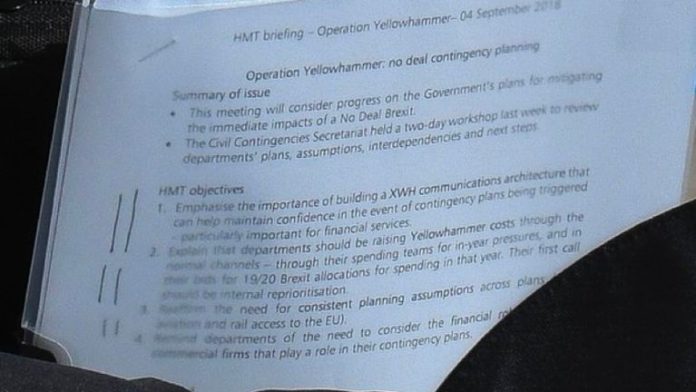A no-deal Brexit would mean delays at Dover, widespread protests, travel disruption and potential shortages of food, medicines and fuel under the worst-case scenario laid out in the government’s official “Operation Yellowhammer” plan.
MPs won a vote to force the Government to release the documents on Monday.
Only one section of the document is redacted. The rest shows:
- ‘Low-income groups will be disproportionately affected by any price rises in food and fuel’
- Disruption at ports will last three months before it starts to improve
- Lorries could face delays of up to 2.5 days
- As Brits will face immigration checks, there will be delays at airports, train stations and ports
- Electricity prices will increase “significantly” to consumers and businesses
- Medicines are “particularly vulnerable” to extended delays
- It will be harder to prevent and control disease outbreaks
- Supplies of fresh food will decrease – there is a risk of panic buying
- UK nationals overseas will lose rights and access to services
- Protests and counter-protests will take place across the UK – ‘there may be a rise in public disorder and community tensions’
- Trade with Ireland will be “severely” disrupted with “agri-food” hardest hit
- There is a likelihood of clashes between fishing vessels as EU nations fishing vessels will be in UK waters
- Care for the elderly services are vulnerable to rising prices and medicine shortages
The document is titled: “Operation Yellowhammer: HMG Reasonable Worst Case Planning Assumptions”.
Rosamund Urwin, the Sunday Times journalist who obtained a leak of the same Yellowhammer document in mid August, wrote on Twitter the Government had since changed its name.
She wrote: “This is the same version the Sunday Times had in mid August. However the header of that was different. It said ‘HMG Planning Assumptions’ then ‘Base Scenario’.”








